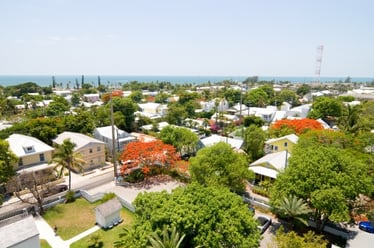Strategic Landscaping Ideas: Reduce Your Summer Air Conditioning Bill
[fa icon="calendar"] May 26, 2015 / by Home Services Expert
 We're a nation of sun lovers, and as Californians, that love may be even more pronounced. But oh, if we could only take a broad aerial view of our home – and better yet, a time-elapsed view that shows how the sun floods our home with warmth throughout the day.
We're a nation of sun lovers, and as Californians, that love may be even more pronounced. But oh, if we could only take a broad aerial view of our home – and better yet, a time-elapsed view that shows how the sun floods our home with warmth throughout the day.
In the winter, this natural resource can be used to real advantage to reduce your heating bills. But in the summer? The sun causes your air conditioner to run longer to cool your home, unnecessarily inflating your air conditioning bills.
The solution is simple and the choices are many: shade your home with trees – and the taller, the better. Look no further than two compelling statistics from the U.S. Department of Energy before heading to your favorite nursery:
- In tree-shaded neighborhoods, the daytime temperature in the summer can be as much as 6 degrees cooler than in barren neighborhoods.
- A well-planned landscape can reduce an unshaded home's cooling costs by between 15 and 50 percent (yes, 50 percent).
A rule of (green) thumb about trees
The words “well-planned landscape” can sometimes strike anxiety in those people who would rather get a green thumb making a good guacamole dip indoors than planting a tree outdoors. So let a qualified air conditioning service company help you simplify the objective of shading your home by steering you to the two basic tree types:
- Evergreen trees (and shrubs) derive their name from their most winning attribute: their ability to stay green all year long. Technically known as coniferous trees, they stay forever green (except when they drop dead leaves) and so provide constant shade.
- Deciduous trees (and shrubs) bloom in the spring and summer, stay colorful in the fall and drop their leaves in the winter. Birth, oak, hickory, maple and willow trees are some of the most common types of deciduous trees.
Maximize shade, reduce your electric bill
With literally dozens of varieties of deciduous trees to choose from, follow some basic planting tips to maximize shade around your home and reduce your summer air conditioning bills:
- Prioritize your shading by planting trees due west of west windows first; then plant shade trees due east of east windows.
- Select a tree (or trees) that can be planted within 20 feet of a window and that will grow at least 10 feet taller than the window.
- Space permitting, plant as many trees as you can to create a continuous shading border along your major west- and east-facing windows.
- Plant a 6- to 8-foot deciduous tree near your home and it should shade a window the same year. Depending on the species of the tree, it should shade the roof in five to 10 years. Obviously, the taller and fuller a tree, the greater shade it will provide – and the more it will cost. But try not to be daunted by the price tag. It might be well worth “crunching the numbers” to see how long it would take, say, for a 15- or 20-foot tree to pay for itself in the money you will save on your summer utility bills.
Plan carefully to the south
It's true that the department of energy also recommends planting deciduous trees to the south of a home to provide shade. But this assertion deserves a second look because it could actually be the least energy efficient location.
Look at it this way: in the summer, when the sun is high in the sky, the shadow of a tree planted south of a home will fall directly under a tree and entirely miss a home -- just when you want the shade the most. And in the winter, the shadow of the same tree will fall directly on top of a home – just when you don't want to block the warm rays of the sun.
To counteract these realities:
- Avoid shading south-facing windows by planting trees at a distance that equals at least twice their mature height away from your home.
- Prune the lower branches on trees located on the southwest or southeast sides of your home to let more winter sun shine through.
While you check and (maybe double-check) your compass to effectively shade your home, don't forget the wisdom of shading your outdoor air conditioning unit. It will run more efficiently if it's shielded from the sun's rays, either with trees – planted at a distance of at least 2 feet to ensure proper air flow – or with a trellis.
Don’t hesitate to contact Experts In Your Home for help in reducing your summer air conditioning bills – and learning how simple it can be to have your summer made in the shade. Our air conditioning technicians serve Chico & surrounding areas. We are experts in your home!



